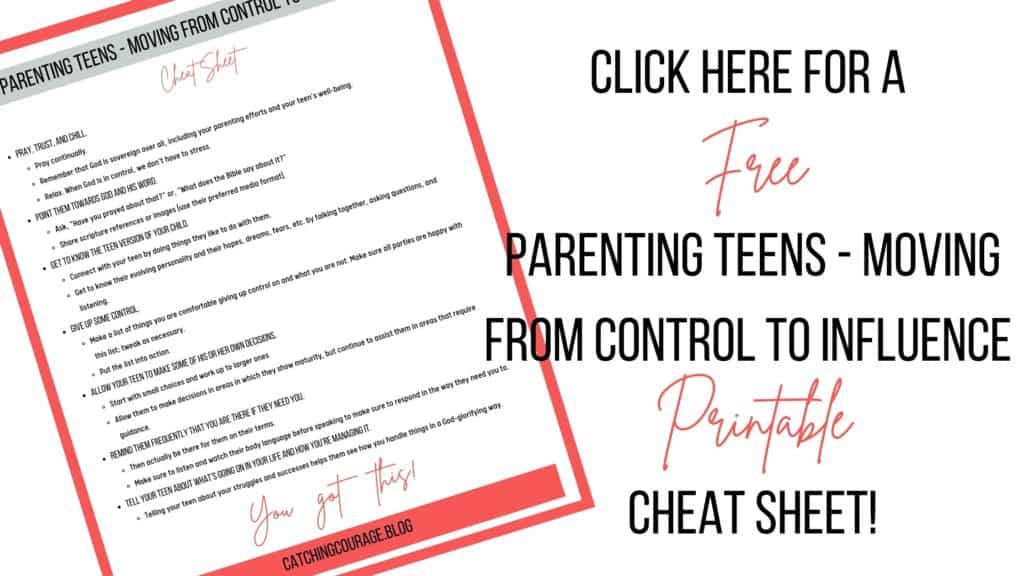Parenting Teens – Moving From Control to Influence (Pt. 2)
Welcome to Part 2 of Parenting Teens – Moving From Control to Influence! If you haven’t read Part 1 yet, I recommend hopping over there first, as it sets the stage for Part 2.
As a refresher, in Part 1 we talked about:
- Pray, trust, and chill.
- Pray continually.
- Remember that God is sovereign over all, including your parenting efforts and your teen’s well-being.
- Relax. When God is in control, we don’t have to stress.
- Point them towards God and His Word.
- Ask, “Have you prayed about that?” or, “What does the Bible say about it?”
- Share scripture references or images (use their preferred media format).
- Get to know the teen version of your child.
- Connect with your teen by doing things they like to do with them.
- Get to know their evolving personality and their hopes, dreams, fears, etc. by talking together, asking questions, and listening.

In Part 2 we will cover points 4 through 7 of this list:
- Pray and trust God, then chill
- Point them toward God and His Word.
- Get to know the teen version of your child.
- Give up some control.
- Allow your teen to make some of his or her own decisions.
- Remind them frequently that you are there if they need you.
- Tell him or her about what’s going on in your life and how you’re managing it.
So let’s get right into it!
Contents
Give Up Some Control
One thing that my husband and I did was to pray for wisdom and then make a list of which things we were comfortable giving our daughter control over and which things we wanted to continue to control. Then we sat down with her and made sure everybody was happy and comfortable with the list.
Once everybody is good with the list, put the list into action. It may be necessary to {kindly} remind each other who is in control sometimes. Old habits die hard. Communication is key to make sure everybody is on the same page and remaining at peace with the way things are going. It’s normal to feel anxious when control shifts. But peace should come as everybody adjusts. If anyone finds that they are still feeling anxious after a week or two, it’s probably time to re-evaluate and come to a different agreement.

As your teen grows and matures, he or she will naturally want more freedom. If you, as the parent, don’t recognize this and work with them to increase their responsibility and privilege level, you run the risk of frustrating them (like it says NOT to do in Ephisians 6:4), which can lead to hopelessness and depression on their part quickly (don’t ask how I know). So revisit the control list from time to time to see what else can be shifted into their control.
Allow Your Teen to Make Some of His or Her Own Decisions
Part of giving up control is letting your teen make more decisions for himself. There are several different ways to go about this. It may take some trial and error, but with good communication, you should be able to reach common ground with your teenager.
Remember those mental notes about your teen’s growth and trouble spots? Here’s where you could put that knowledge to good use. In the areas your teen has shown maturity, let them start making some decisions. In the areas that still need nurturing, continue to help them in the decision-making process so they can see how to apply knowledge and wisdom from previous experiences to the decision at hand.
Or you could start with small stuff and gradually work your way up. This is where we started. We gave our daughter control over choosing her books, then her TV shows, then phone apps. Of course, we had parental controls set on her electronics to ensure she didn’t choose inappropriate things, but she gained some independence in those areas as we saw that she could handle it. You could also let them choose which chores they want to do for the family and when, instead of dictating those things.

As you are giving them more independence, check-in with them from time to time to make sure they feel ok with the level of independence they currently have. It may be that it is making them uncomfortable and they want to give some of it back to you. Or they might feel ready for more. On the other hand, is there something you’ve consented to, but are still feeling anxious about? Constant communication is key to getting to a place where everybody feels the situation is safe and is happy.
Throughout this process, ask how some of your teenager’s decisions and actions are playing out. In doing so, you can make sure she is making good choices in her new independence This also helps her connect her actions and decisions to the consequences, good and bad, increasing the learning taking place throughout this process.
Remind Them Frequently That You Are There
As you move from control to influence with your teen, it may seem easiest to pull away altogether. After all, it’s a lot of work to manage this process, and it can be stressful. But resist this temptation. Instead, remind your teenage son or daughter that you are there for them, no matter what.
And then actually be there for them. Teens have great timing, don’t they? They seem to only want to talk when you want to be doing something else, like watching “The Chosen,” or sleeping, or making dinner. If you approach them to talk at a time that’s convenient for you, you most often get nothing in return. Go figure. But it’s so important to engage with them on their terms.

Sacrificing your priorities for them is a very Jesus-like thing to do. Your teen will recognize and appreciate your sacrifice, and so will Jesus. Jesus himself said, “There is no greater love than to lay down one’s life for one’s friends (and teens).” (John 15:13). I added that bit about teens, in case that wasn’t obvious :-).
When they do come to you, watch their body language and listen to their tone of voice to attempt to determine their state of mind. Are they frustrated? Happy? Excited? Sad? When you’ve determined their state of mind, try to get into it with them (empathize).
Then try to ascertain what they want or need from this interaction. Is it a listening ear? A shoulder to cry on? A story from your teen years so they know you understand where they’re coming from? Advice? Probably save advice for last, or at least ask if they want it before you give it. Sometimes, if advice is what they need, they can talk themselves through their own issues and come to their own conclusions. They will appreciate this much more than you shoving your opinions and advice down their throats.
Tell Your Teen About What’s Going on in Your Life
Now, I’m not saying you should go and tell your teen everything. Anything inappropriate or that might undermine their respect for an authority figure should be kept off the table. However, maybe there’s a work assignment you’re struggling with or you’re working on winning over a neighbor to Jesus.
Discussions about these types of things can show your teen that you have wins and losses, too, and that there is a right and wrong way to deal with them. And it can help your teen see you as a human being instead of just their parent.
Parenting Teens Summary
To sum up part 2 of Parenting Teens – Moving From Control to Influence, parents of teens should move from control to influence by doing the following:
- Give up some control.
- Make a list of things you are comfortable giving up control on and what you are not. Make sure all parties are happy with this list; tweak as necessary.
- Put the list into action.
- Allow your teen to make some of his or her own decisions.
- Start with small choices and work up to larger ones.
- Allow them to make decisions in areas in which they show maturity, but continue to assist them in areas that require guidance.
- Remind them frequently that you are there if they need you.
- Then actually be there for them on their terms.
- Make sure to listen and watch their body language before speaking to make sure to respond in the way they need you to.
- Tell your teen about what’s going on in your life and how you’re managing it.
- Telling your teen about your struggles and successes helps them see how you handle things in a God-glorifying way.
Conclusion
When kids are young, they rely on their parents for everything. And most parents do the best that they can to provide everything their kids need. This provision leads to comfort, and comfort leads to attachment. But as kids get older and approach their teen years, they begin to provide for themselves more and more. As they do, they become less attached to their parents and develop a desire to control more of their environment instead of always being controlled.
This shift can lead to power struggles that can be exhausting and cause strain on family relationships. Instead of continuing to engage in these struggles for power, smart parents of teens move from control to influence in a deliberate and controlled manner. Doing so effectively teaches teens how to make their own decisions and control their own environment while still under the watchful eye of caring parents. Is it easy? No, but it’s so worth it to raise up adults who can make Godly choices and not struggle for power their whole lives.
What are some things that have helped you move from control to influence in parenting your teens? Comment below!

Catch ya’ later,

PS Here are more great resources on communicating with, encouraging, teaching, and helping teens as they navigate life into adulthood.
Follow Catching Courage!





